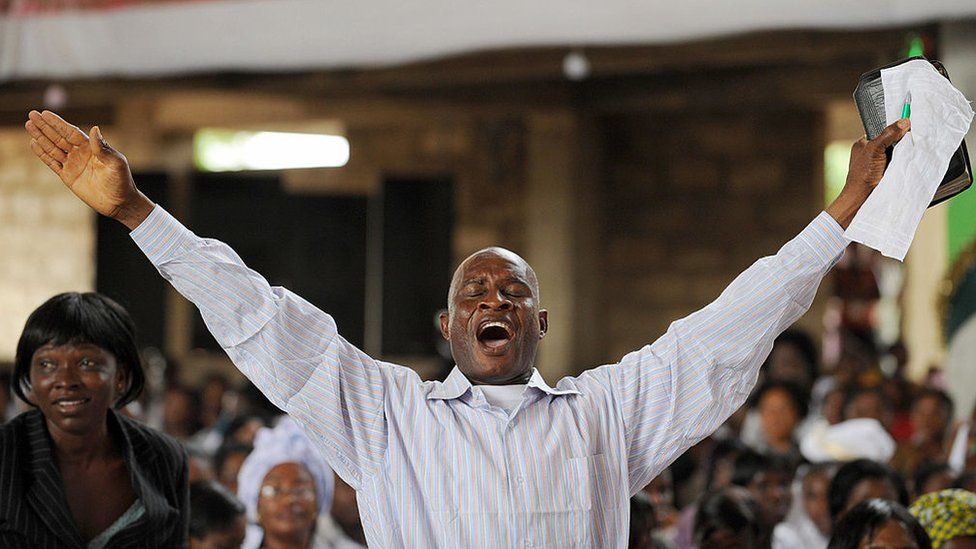Tech inspired by faith booms in Africa
- Published

"You sign up to a church here and you are in multiple countries, because you have branches all over the world. So, from day one you are an international software company."
So says Nana Agyeman-Prempeh from Ghana, chief executive and one of four co-founders at Asoriba, which provides management software for churches.
It enables them to keep in touch with their congregations via mobile apps and text messages, and, crucially, monitor and collect digital donations and tithes. They can also send tailored content to individual members of the church.
The company was launched in 2014 and a year later was crowned Africa's best start-up in Seedstars World's global competition.
The son of a pastor, Mr Agyeman-Prempeh saw firsthand the issues faced by those running Ghana's churches - inefficient attendance monitoring and financial tracking, poor communication and engagement with church members, and difficulties in promoting events.
He and his co-founders, who are all Christian, also spotted a business opportunity.
The website does not list Asoriba's prices, but in an interview last year Mr Agyeman-Prempeh said subscriptions start at $9 (£6.75) per month.
"The church already buys things - clothes for people; it builds schools; lots of churches on the radio pay for airtime and some on TV - it's nothing new," he says of his service, which he plans to extend beyond Ghana to Tanzania, Gambia, Nigeria and Kenya.
"It's just being able to adapt existing technology to do your work better," he adds.
At its most basic, a rural village pastor can simply stay in touch with his church headquarters via the mobile app and keep attendance records, Mr Agyeman-Prempeh said in a BBC interview this year.
Church Plus, a similar venture founded by Peter Ihesie in Nigeria, was launched in 2013. He witnessed the difficulties faced by church officials, in this instance, his wife's family.
"When I got into IT I thought I could come up with some software for them," he says.
But the initial software, launched in 2013, proved to be unsustainable.
"The cost of supporting it was too high," he says.
But Church Plus now has about 100 churches using the latest version of the software, with many more signing up for trials, says Mr Ihesie.
Is nothing sacred?
One big issue facing Asoriba, Church Plus and many other religious apps and web services is data security.
"It's a trust business," Mr Agyeman-Prempeh says. "The issue of how safe is the data is a genuine concern and it keeps coming up.
"We are housing data for millions of people and this is not fake data… people's lives revolve around churches."
It seems such concerns may be justified.
A study by cybersecurity firm Proofpoint in 2015 looked at malware lurking in religious apps - and the worst culprits were Bible-themed ones.
Its team analysed 5,600 Bible apps on both Apple and Android platforms and discovered malicious code in 240 of them, while a further 140 were deemed "high risk".
"Many Bible apps do not have privacy policies, which is fitting since many apps send data about the user to a variety of countries," Proofpoint wrote in a blog post.
"All told, Bible apps communicate data to over 2,500 servers across forty-two countries," the tech firm said.
Proofpoint also looked at nearly 4,500 Quran apps and found 16 contained malware and 38 were "high risk", while of the 200 Torah apps available, two carried known malware code.
"Clearly, one cannot judge a book by its cover," the firm noted.
'Scrimp and save'
Despite the security risks, some people believe these apps are instilled with rather more positive special powers.
"After downloading this wonderful app my phone stopped crashing," gushed one reviewer of the Nigeria-based Pastor Chris Digital Library app, which has racked up more than 100,000 downloads on the Google Play Store alone.
Other religious-themed apps and online services are flourishing in Africa.
For example, Everyday Church Online is a digital church that holds online services every Sunday. It has a growing following in Africa, online pastor Darren Parker tells the BBC.
"The majority of people using our church platform and Facebook page are on mobile devices - particularly in Africa," he says.
"We are finding the use of mobiles in even the poorest areas. People literally scrimp and save to get a mobile. Where there's poverty it's the faith that gets them through."
Digital Sharia
The Pew Research Center estimates that four out of every 10 Christians in the world will live in sub-Saharan Africa by 2050 - but also that the global population of Muslims will be almost as large.
Cassim Ismail set up the Muslim Directory website, app and print version in 2008 in South Africa. The idea was to provide useful information for Muslim tourists as well as connecting the local community.
"The requirements of the lifestyle as a Muslim as indicated in Sharia may be challenging if you are not familiar with an area," Mr Ismail says.
"Requirements such as halal restaurants, halal accommodation, finding a nearby mosque or even a burial service where needed. Even prayer times differ at various locations."
Advertising with Mr Ismail costs between 500 and 5,000 Rand (£26-£260; $35-350) but non-profit organisations and Muslim services are listed for free - only businesses are charged, but they must also be "Sharia-compliant", he says.
The web platform gets about 5,000 hits a month, he says, but his directory is no longer the only one in town.
"There are a few competitors now," he admits.
Even religion is not immune to digital competition it seems.